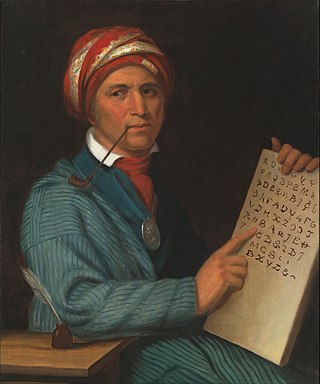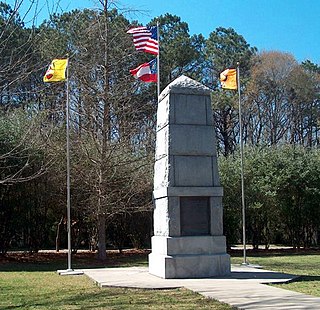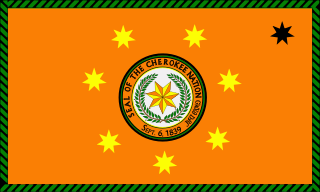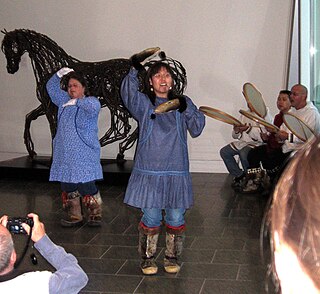Citizenship is an allegiance of a person to a state.

Indian removal was the United States government policy of forced displacement of self-governing tribes of Native Americans from their ancestral homelands in the eastern United States to lands west of the Mississippi River – specifically, to a designated Indian Territory. The Indian Removal Act, the key law which authorized the removal of Native tribes, was signed by Andrew Jackson in 1830. Although Jackson took a hard line on Indian removal, the law was enforced primarily during the Martin Van Buren administration. After the passage of the Indian Removal Act in 1830, approximately 60,000 members of the Cherokee, Muscogee (Creek), Seminole, Chickasaw, and Choctaw nations were forcibly removed from their ancestral homelands, with thousands dying during the Trail of Tears.

The Cherokee are one of the indigenous peoples of the Southeastern Woodlands of the United States. Prior to the 18th century, they were concentrated in their homelands, in towns along river valleys of what is now southwestern North Carolina, southeastern Tennessee, southwestern Virginia, edges of western South Carolina, northern Georgia, and northeastern Alabama.

The Trail of Tears was an ethnic cleansing and forced displacement of approximately 60,000 people of the "Five Civilized Tribes" between 1830 and 1850 by the United States government. As part of the Indian removal, members of the Cherokee, Muscogee (Creek), Seminole, Chickasaw, and Choctaw nations were forcibly removed from their ancestral homelands in the Southeastern United States to newly designated Indian Territory west of the Mississippi River after the passage of the Indian Removal Act in 1830. The Cherokee removal in 1838 was brought on by the discovery of gold near Dahlonega, Georgia, in 1828, resulting in the Georgia Gold Rush.

The term Five Civilized Tribes was applied by European Americans in the colonial and early federal period in the history of the United States to the five major Native American nations in the Southeast—the Cherokee, Chickasaw, Choctaw, Muscogee, and Seminoles. Americans of European descent classified them as "civilized" because they had adopted attributes of the Anglo-American culture. Examples of such colonial attributes adopted by these five tribes included Christianity, centralized governments, literacy, market participation, written constitutions, intermarriage with white Americans, and chattel slavery practices, including purchase of enslaved African Americans. For a period, the Five Civilized Tribes tended to maintain stable political relations with the European Americans, before the United States promoted Indian removal of these tribes from the Southeast.
Worcester v. Georgia, 31 U.S. 515 (1832), was a landmark case in which the United States Supreme Court vacated the conviction of Samuel Worcester and held that the Georgia criminal statute that prohibited non-Native Americans from being present on Native American lands without a license from the state was unconstitutional. The opinion is most famous for its dicta, which laid out the relationship between tribes and the state and federal governments. It is considered to have built the foundations of the doctrine of tribal sovereignty in the United States.

Tribal sovereignty in the United States is the concept of the inherent authority of indigenous tribes to govern themselves within the borders of the United States.
Cherokee Nation v. Georgia, 30 U.S. 1 (1831), was a United States Supreme Court case. The Cherokee Nation sought a federal injunction against laws passed by the U.S. state of Georgia depriving them of rights within its boundaries, but the Supreme Court did not hear the case on its merits. It ruled that it had no original jurisdiction in the matter, as the Cherokees were a dependent nation, with a relationship to the United States like that of a "ward to its guardian," as said by Chief Justice Marshall.

Chadwick "Corntassel" Smith is a Native American politician and attorney who served as Principal Chief of the Cherokee Nation. He was first elected in 1999. Smith was re-elected to a second term as Chief in 2003 and a third term in June 2007 with 59% of the vote. He was defeated in his attempt to get elected to a fourth term in office by Bill John Baker 54% to 46% in the 2011 election and he lost again to Baker in 2015, receiving 28% of the vote. Prior to being elected Principal Chief, he worked as a lawyer for the tribe and in private practice.

A tribal chief or chieftain is the leader of a tribal society or chiefdom.

The Cherokee Nation, also known as the Cherokee Nation of Oklahoma, is the largest of three Cherokee federally recognized tribes in the United States. It includes people descended from members of the Old Cherokee Nation who relocated, due to increasing pressure, from the Southeast to Indian Territory and Cherokee who were forced to relocate on the Trail of Tears. The tribe also includes descendants of Cherokee Freedmen, Absentee Shawnee, and Natchez Nation. As of 2023, over 450,000 people were enrolled in the Cherokee Nation.
Transnational citizenship is a political concept which would redefine traditional notions of citizenship and replaces an individual's singular national loyalties with the ability to belong to multiple nation states, as made visible in the political, cultural, social and economic realms. Unlike national citizenship, where individuals interact in such capacities with one sovereign state, transnational citizenship transcends pre-established territorial boundaries in order to create a modern meaning of "belonging" in an increasingly globalized society. Additionally, while preconceived notions of citizenship are often divided between national, social and individual forms of identity, all three categories serve to contribute to the meaning of transnational citizenship. State citizenship can be defined as an individual establishing their sense of belonging by espousing to the liberal-democratic values of the state in the public sphere. When applied to transnational citizenship, an individual would have the opportunity to be civically engaged in multiple societies.
The Cherokee Freedmen controversy was a political and tribal dispute between the Cherokee Nation of Oklahoma and descendants of the Cherokee Freedmen regarding the issue of tribal membership. The controversy had resulted in several legal proceedings between the two parties from the late 20th century to August 2017.
Cherokee heritage groups are associations, societies and other organizations located primarily in the United States. Such groups consist of persons who do not qualify for enrollment in any of the three federally recognized Cherokee tribes. As the Cherokee Nation enrolls all people who can prove descent from a Cherokee ancestor, many of these groups consist of those who claim Cherokee ancestry but have no documentation to prove this heritage. A total of 819,105 Americans claimed Cherokee ancestry in the 2010 Census, more than any other named ancestral tribal group in the Census.

Native American identity in the United States is a community identity, determined by the tribal nation the individual or group belongs to. While it is common for non-Natives to consider it a racial or ethnic identity, it is considered by Native Americans in the United States to be a political identity, based on citizenship and immediate family relationships. As culture can vary widely between the 574 extant federally recognized tribes in the United States, the idea of a single unified "Native American" racial identity is a European construct that does not have an equivalent in tribal thought.

Native American recognition in the United States, for tribes, usually means being recognized by the United States federal government as a community of Indigenous people that has been in continual existence since prior to European contact, and which has a sovereign, government-to-government relationship with the Federal government of the United States. In the United States, the Native American tribe is a fundamental unit of sovereign tribal government. This recognition comes with various rights and responsibilities. The United States recognizes the right of these tribes to self-government and supports their tribal sovereignty and self-determination. These tribes possess the right to establish the legal requirements for membership. They may form their own government, enforce laws, tax, license and regulate activities, zone, and exclude people from tribal territories. Limitations on tribal powers of self-government include the same limitations applicable to states; for example, neither tribes nor states have the power to make war, engage in foreign relations, or coin money.
The Cherokee Tobacco Case, 78 U.S. 616 (1870), is a United States court case with implications relating to tribal sovereignty in the United States.
The Cherokee have participated in over forty treaties in the past three hundred years.
United States v. Sandoval, 231 U.S. 28 (1913), was a United States Supreme Court case deciding whether the federal government's law prohibiting liquor on the land of Santa Clara Pueblo impermissibly infringed on the State of New Mexico's police power under the equal footing doctrine. In a unanimous decision, the Court upheld the law and Congress's ability to recognize and regulate tribes. Citing broad congressional authority in Kagama, recognition of tribes subject to the guardianship of the federal government falls on Congress, not the Court, as long as recognition is not "arbitrary" and actually reflects "distinctly Indian communities."

The Cherokee Nation was a legal, autonomous, tribal government in North America recognized from 1794 to 1907. It was often referred to simply as "The Nation" by its inhabitants. The government was effectively disbanded in 1907, after its land rights had been extinguished, prior to the admission of Oklahoma as a state. During the late 20th century, the Cherokee people reorganized, instituting a government with sovereign jurisdiction known as the Cherokee Nation. On July 9, 2020, the United States Supreme Court ruled that the Muscogee (Creek) Nation had never been disestablished in the years before allotment and Oklahoma Statehood.










